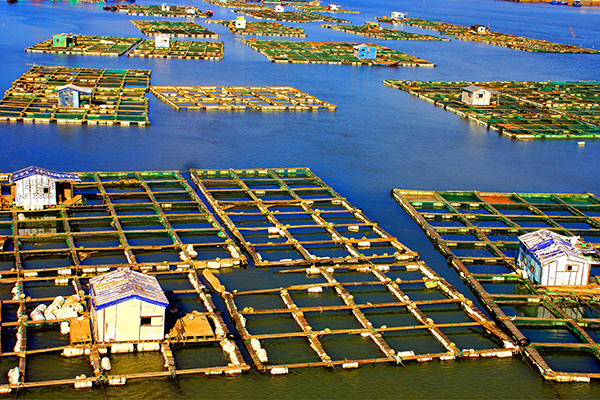January 9, 2015
China's aquaculture sector can tip the balance in world fish supplies
China's booming aquaculture industry and appetite for fish is putting strain on wild fisheries, according to a new study led by researchers from Stanford University and UOW.

Fish farms scatter the harbour of Dongtou, off the coast of eastern China. Photo: Jan-Christian Teller (CC BY 2.0)
In a paper published today in the journal Science, a research team led by Stanford’s Center on Food Security and the Environment offers the clearest picture to date of China’s enormous impact on wild fisheries. The study also presents the case for the need for more sustainable alternatives to the current practice of using wild-caught fish to feed farm-raised fish.
China is the world's leading producer, consumer and processor of fish, contributing one-third of the global supply. China’s fish production has tripled in the past 20 years, and about three-quarters of its supply is from fish farms.
Contributing author Duncan Leadbitter, an Honorary Research Fellow at UOW’s Australian National Centre for Ocean Resources & Security (ANCORS), said China’s economic growth was placing increased stresses on natural systems such as wild fisheries at a time when many have been overexploited and efforts are underway to both recover stocks and implement better management.
“Aquaculture is often promoted as a mechanism for reducing pressure on wild stocks on the assumption that demand for seafood can continue to increase even if wild stocks cannot be exploited further,” he said.
“The fact is that many species require fish oil and fishmeal as part of their diet and even though feed use has become more efficient in the past few decades, the ongoing expansion in production is ensuring that the pressure on wild stocks remains high.”
Fishing in the coastal waters of China is poorly regulated and often indiscriminate. The result is large volumes of assorted “trash fish” – species that are undesirable for human consumption - that end up in animal feeds, including in fishmeal that is fed to farm-raised fish. Many of the species of wild fish used for feeds have been fully exploited or overexploited, and reducing their demand can help protect fragile ocean ecosystems.
“Trash fish are largely unrecorded in world fisheries statistics and its use is putting species and ecosystems at risk,” Mr Leadbitter said. “The scale of China’s aquaculture production has been known for some time, but the demands on wild harvest fish as a source of feed have not been explored.
“This study begins the process of encouraging closer scrutiny of the implications of China’s growing demand for seafood and how it can be encouraged to become a key player in the push for sustainability.”
The paper’s lead authors, Ling Cao and Professor Rosamond Naylor from Stanford outline an opportunity for positive change through recycling the waste by-products from seafood processing plants across China. This waste, which can be 30 to 70 per cent of the incoming volume of fish, is often discarded or discharged into nearby waters.
These processing wastes could satisfy between half and two-thirds of the current volume of fishmeal used by Chinese fish farmers, replacing much of the wild fish currently used in feeds.
Quality and food safety are two potential barriers to replacing wild-caught fish with fish processing wastes, but the paper’s authors say these can be overcome through adding plant-based protein sources to the fishmeal, while contamination and disease can be addressed through research and tight regulation.
"It's time to make serious decisions about managing and protecting ocean fisheries, and China will play a pivotal role in this process," Professor Naylor said. “Collecting good data from China is an important starting point. But we also need a clear path toward more sustainable fisheries and aquaculture management, and that’s what we present in this paper.”
"This is a critical juncture for China," lead author Ling Cao said. "If the country makes proactive reforms to its aquaculture sector, like using fish processing wastes instead of wild fish, and generally reducing the amount of fishmeal in aquafeeds, it can greatly improve the sustainability of the industry. If not, the consequences for the entire global seafood supply chain are going to be really serious."
The research was funded by the Lenfest Ocean Program of The Pew Charitable Trusts, the China Fund of the Freeman Spogli Institute for International Studies at Stanford University, the EU-FP7 Sustaining Ethical Aquaculture Trade (SEAT) project and the David and Lucile Packard Foundation.
Note to media
More information, including a copy of the paper, can be found online at eurekalert.org (log in required).
Media contact
Grant Reynolds, UOW Media & PR Officer, +61 417 010 350 or grantr@uow.edu.au or for Stanford University, Laura Seaman lseaman@stanford.edu.